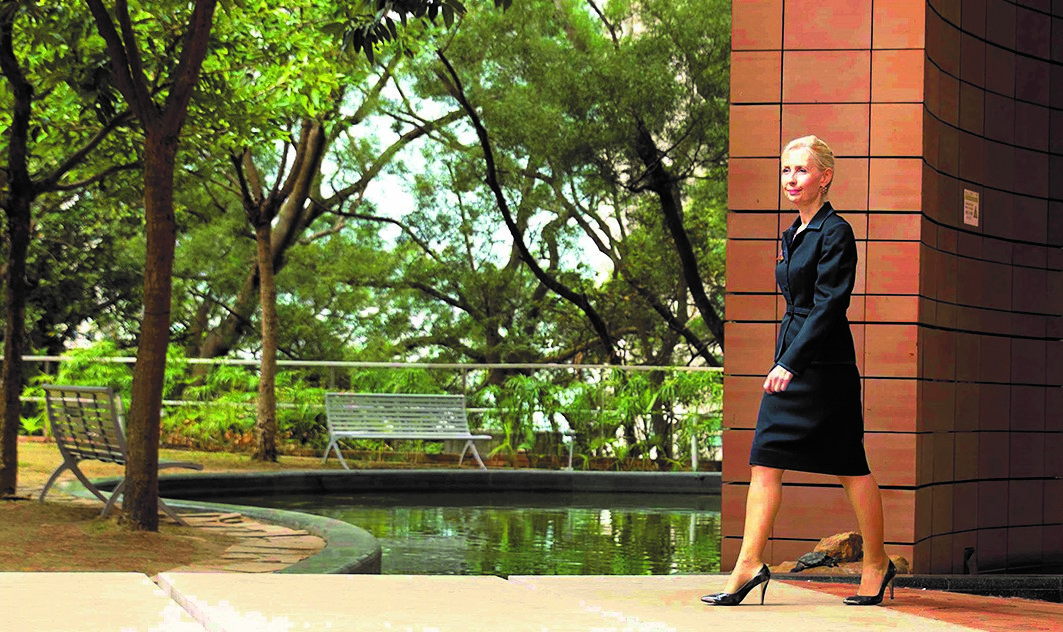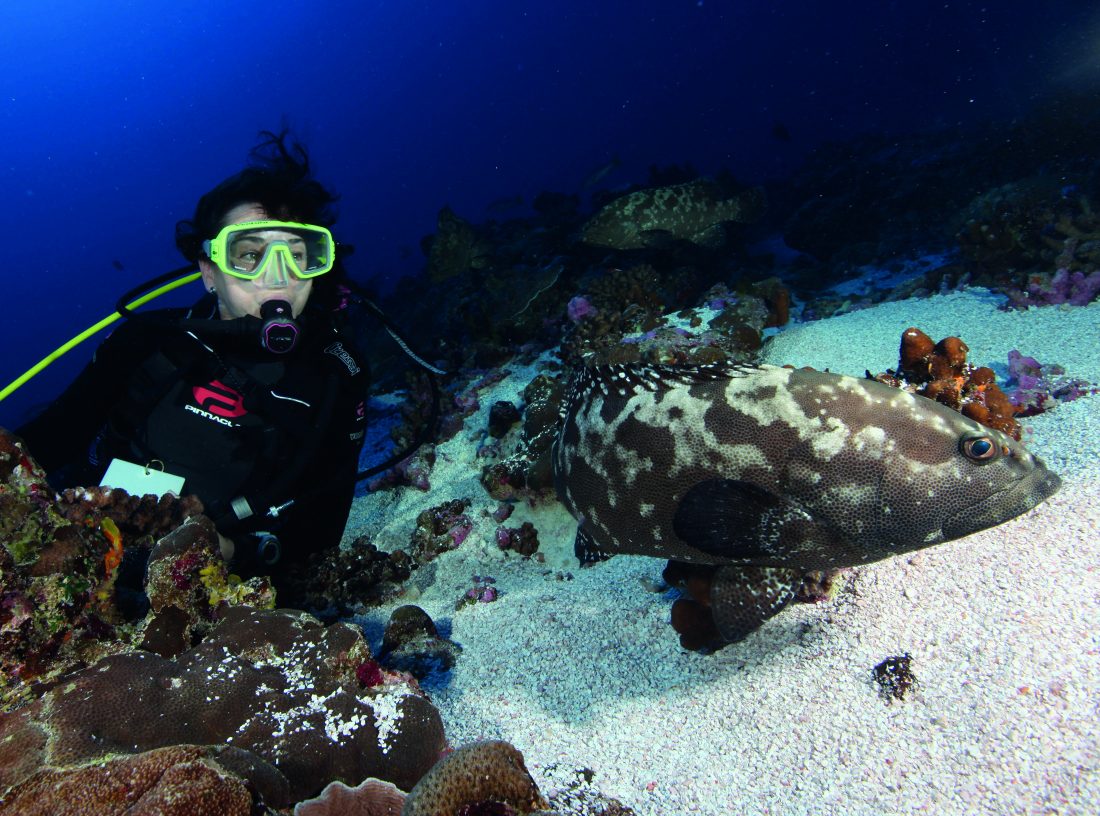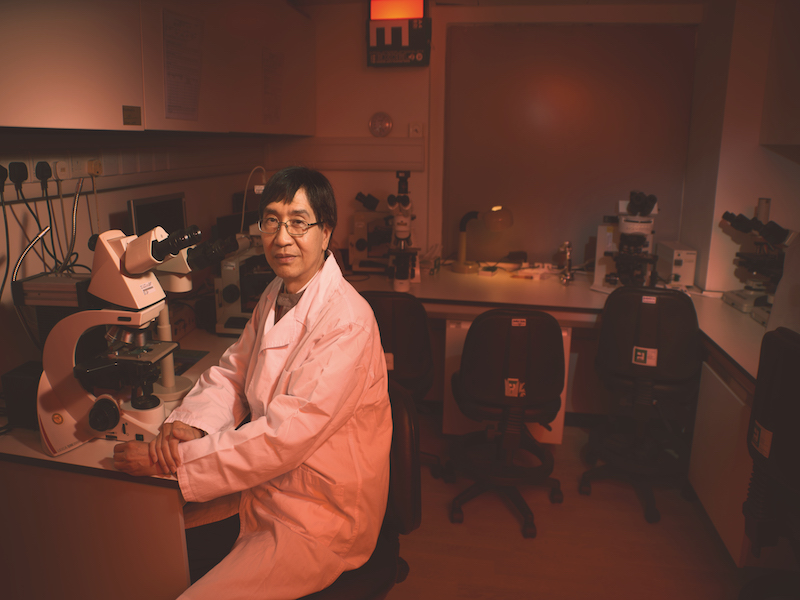Advocate for Animals
Amanda Whitfort | Law
Associate Professor Amanda Whitfort of the Faculty of Law uses her legal expertise to save animals locally and globally. Her landmark 2010 Review of Animal Welfare Legislation in Hong Kong, co-authored with Dr Fiona Woodhouse, Deputy Director (Welfare) of the Society for the Protection of Cruelty to Animals, (Hong Kong), led to a new Hong Kong law being enacted in 2016 to protect animals from cruelty in the pet trade.
“We had a law enacted that has stopped the unlicensed breeding of dogs, which was taking place in appalling conditions. There were sick animals kept in cages, and then being sold online.” Whitfort explained her hands-on approach to investigating abuses: “I sent vets to slaughterhouses, farms, shelters and pet stores.”
Whitfort is now working to halt wildlife trafficking, a move that could have international impact, given Hong Kong’s role as a global hub between African habitats and lucrative Asian markets for endangered species.
She has been invited to feature in six training videos for the Hong Kong judiciary on the impact of wildlife crime, and is advocating for a change in Hong Kong law so that wildlife trafficking is recognised as an organised and serious crime.
At a conference co-organised by HKU’s Centre for Comparative and Public Law and ADM Capital Foundation (ADMCF), Whitfort spoke with two other academics, Honorary Professor Yvonne Sadovy and Dr Caroline Dingle of the School of Biological Sciences, in a vivid testimony to the ongoing work on animal welfare across disciplines.
“To underpin effective law enforcement, we need reliable evidence identifying trafficked species provided by forensic scientists like Dr Caroline Dingle,” Whitfort said.
Dr Dingle uses technologies such as genetic identification to discover the origins of trafficked animals at HKU’s Conservation Forensics Lab, the first facility of its kind in Hong Kong.
Hong Kong seizures of precious ivory, rhino horn and pangolin scales since 2013 potentially equate to the deaths of 3,000 elephants, 51 rhinoceros and 64,000 pangolins, according to a report co-authored by Ms Whitfort and published by ADMCF.
The government estimates the value of illegal wildlife seizures at HK$87 million to HK$142 million a year. Whitfort also pointed out that wildlife crime was linked to other crimes, such as violence against rangers in Africa.
“The global demand for wildlife products is at its highest in Asia. The average value of seizures is now second only to dangerous drugs. We have a responsibility to get this right.”
Deploy Tech for Ocean Life
Yvonne Sadovy | Science
Professor Sadovy, a world-renowned expert in reef fish, has been working at HKU since 1993 to advocate protection for fishes that are threatened with extinction and to achieve sustainable management of reef fish fisheries.
In 1998, she founded the International Union for Conservation of Nature Specialist Group for Grouper and Wrasse (types of reef fish) and in 2000 co-founded Science and Conservation of Fish Aggregations (SCRFA), which she currently directs, and collaborates with bodies such as the World Wide Fund for Nature, TRAFFIC, and the United Nations Food and Agriculture Organization.
In addition to her teaching and research at the School of Biological Sciences, she works at The Swire Institute of Marine Science (SWIMS) at HKU, a research facility at Cape D’Aguilar on the shores of Hong Kong’s only marine reserve. SWIMS’ research covers the waters from Southeast Asia to the Northwest Pacific.
“In a truly globalised world, large urban centres like Hong Kong are responsible for extensive trade connections, but also for ensuring that they do not threaten the fish and fisheries outside of the city that we import and depend on,” said Professor Sadovy, whose field research at HKU has taken her to far-flung places such as Palau, Fiji and French Polynesia in the Western and Central Pacific.
Professor Sadovy is working with Corvidae, a tech start-up that was launched in 2016 at HKU’s innovation and entrepreneurship hub iDendron. They are developing an app , called ‘Saving Face’ that Hong Kong enforcement officers are already trialling to identify illegally imported fish, just by pointing a mobile phone at a restaurant or wet market fish tank and photographing target fish.
“We have a problem in Hong Kong – a lot of fish are being brought in illegally, like ‘so mei’ 蘇眉”, Professor Sadovy said, referring to the Chinese name for Napoleon fish, a species she has long studied.
The phone app can identify what Professor Sadovy calls “these incredible markings on the face of the animal we can use to distinguish among individual animals, just like we use fingerprints for people. We can track legally imported fish in this way”
“It’s incredible – it’s an adaptation of facial recognition. It’s very exciting to work with this technology,” she said. The app highlights that fish are individuals and have personalised faces that we can distinguish, just like humans.
“Ultimately this is not just about legal and sustainable trade. Conservation and good natural resource practices are about improving the relationship between humans and animals, and how we perceive and use other species. We must be sure not to threaten their populations so they are around for us to enjoy – whether to eat them or, as divers, to enjoy seeing them in the water, and knowing they will be there for the next generation”.
Respect Animals, Save Human Lives
Yuen Kwok-yung | Medicine
“Seventy-five percent of emerging infectious agents are coming from animals. These include the bird flu, SARS, MERS and Rat hepatitis E virus,” said Professor Yuen Kwok-yung 袁國勇 (MBBS 1981; MD 1998), Henry Fok Professor in Infectious Diseases and Chair of Infectious Diseases in the Department of Microbiology at the Li Ka Shing Faculty of Medicine.
Professor Yuen, an international expert in animal-borne illness, has been advocating improving human wealth by promoting animal hygiene and welfare.
“When we care for livestock and respect wildlife, both animals and humans benefit,” he said.
After the 2003 SARS epidemic, he and his team discovered that Chinese horseshoe bats (Rhinolophus sinicus) are the natural reservoir that carried the ancestral bat SARS coronavirus, which may have mutated and spread to civets before jumping into humans. He called on the public to refrain from eating civets, which were considered a delicacy in Southern China.
“It would be important for us to respect the habitats of wild animals; maintain good farm and market biosecurity with no live poultry in the wet market in the long run; and control the rat and mosquito populations in the urban area,” Professor Yuen said. “Besides doing microbial surveillance, we have to research for broad spectrum antiviral drugs and universal vaccines to prepare for coming epidemics.”
For more than a decade, Professor Yuen has spoken out against live poultry sales and slaughtering at wet markets. He called the practice and conditions of keeping live chickens at the markets “abnormal”.
His research on animal-borne diseases dates back to the 1997 avian influenza outbreak, when his research on the H5N1 virus’ severity and mortality rate was published in The Lancet.
In February 2019, he warned that even healthy adults could be at risk of rat-to-human hepatitis E infection after Canada reported the first such case outside of Hong Kong. In 2018, Professor Yuen’s team revealed that world’s first two rat-to-human infections took place in Hong Kong, shedding light on hygiene problems in dense urban areas where animals and humans live side by side.



